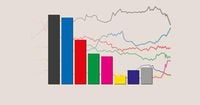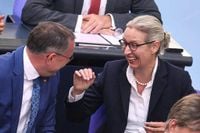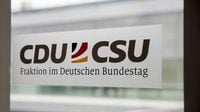In a surprising turn of events, the Alternative for Germany (AfD) has overtaken the Christian Democratic Union (CDU) in voter favorability, marking a significant shift in the political landscape of Germany. According to a recent Forsa poll conducted for RTL and ntv, the AfD now stands at 26 percent, just ahead of the CDU and the Christian Social Union (CSU), which remain at 25 percent. This development comes as the Social Democratic Party (SPD) holds steady at 15 percent, while the Greens have seen a slight decline to 11 percent. The Left party is at 9 percent, and the Free Democratic Party (FDP) has made a minor improvement to 4 percent, matching the newly established BSW party, which also holds 4 percent.
This shift in voter preferences highlights the growing support for the AfD, which has emerged as the biggest beneficiary of the decline experienced by the Ampel coalition parties—SPD, Greens, and FDP. These parties, once seen as dominant after the 2021 Bundestag election, have struggled to maintain their voter base. The SPD was initially the strongest party in polls but was quickly surpassed by the Union, while the Greens and FDP have also experienced significant losses. With the AfD rising to become the second strongest party by mid-2023, the political dynamics in Germany are shifting dramatically.
On April 22, 2025, CDU politician Thorsten Frei announced that the future black-red government plans to increase defense spending, which may lead to cuts in the social system. He described these potential changes as "unpleasant decisions" that the government will need to address. This announcement comes amid rising concerns about the sustainability of social programs in light of increased defense expenditures.
Meanwhile, Friedrich Merz, the leader of the CDU, has been actively promoting confidence in the new government. On April 21, he delivered a ceremonial farewell to outgoing Chancellor Olaf Scholz, while simultaneously encouraging the public to look forward to the upcoming changes. Merz's Easter address, however, did not go without criticism, as many citizens expressed dissatisfaction with his message on social media.
A recent survey conducted among CDU members in Berlin revealed that they graded the coalition agreement with the SPD a 3, indicating mixed feelings about the partnership. The results of this survey were released on April 20, 2025, reflecting the party's internal sentiments as they prepare for the new government.
In the context of political problem-solving competence, the Forsa poll indicates that 21 percent of German citizens believe the CDU is best equipped to handle the country's challenges, while only 12 percent trust the AfD with this responsibility. Notably, 47 percent of respondents expressed a lack of confidence in any party's ability to solve current issues, highlighting a significant disconnect between the electorate and political institutions.
As Friedrich Merz prepares for his expected election as Chancellor on May 6, 2025, he aims to improve the mood in the country by summer. His strategy involves addressing the concerns of voters and restoring faith in the CDU's leadership. However, skepticism remains among voters from other parties, with 53 percent believing that Merz would not govern better than Scholz, compared to 42 percent who think he would.
The political landscape in Germany is further complicated by the ongoing debates surrounding the AfD. On April 17, CDU's parliamentary vice president Jens Spahn initiated a discussion about how to engage with the AfD, which has received both criticism and unexpected support. This conversation reflects the challenges that mainstream parties face in addressing the rise of populist movements.
Polling data from the past weeks shows that the CDU/CSU is still leading in recent surveys, with a notable 25 percent in the latest polling conducted on April 19, 2025. However, the increasing popularity of the AfD poses a significant challenge for the traditional parties, as they navigate the complexities of voter sentiment and policy priorities.
The current political climate also raises questions about the future of the Ampel coalition. The FDP, which has struggled to clear the 5 percent threshold in recent elections, faces an uphill battle as voter preferences shift. The party’s decline is indicative of broader trends affecting coalition politics in Germany, where the electorate appears to be gravitating towards more radical options.
As the political landscape evolves, the upcoming elections will be crucial in determining the direction of Germany’s governance. With the CDU/CSU and AfD vying for the top position, the stakes are high, and the implications of these shifts could resonate for years to come. The CDU's ability to address social concerns while increasing defense spending will be closely scrutinized, as voters weigh their options in the lead-up to the elections.
In summary, the rise of the AfD and the challenges facing the CDU highlight a pivotal moment in German politics. As parties prepare for the upcoming elections, the electorate's concerns about governance, social spending, and political representation will play a significant role in shaping the future of the country.






